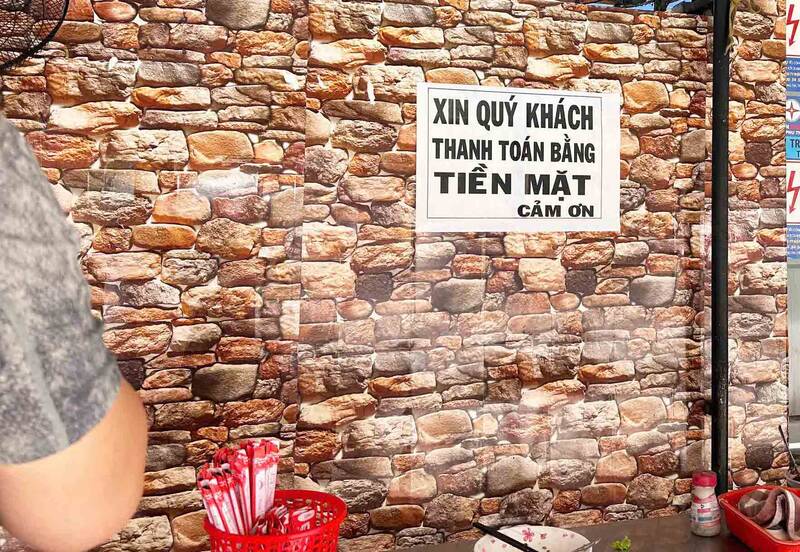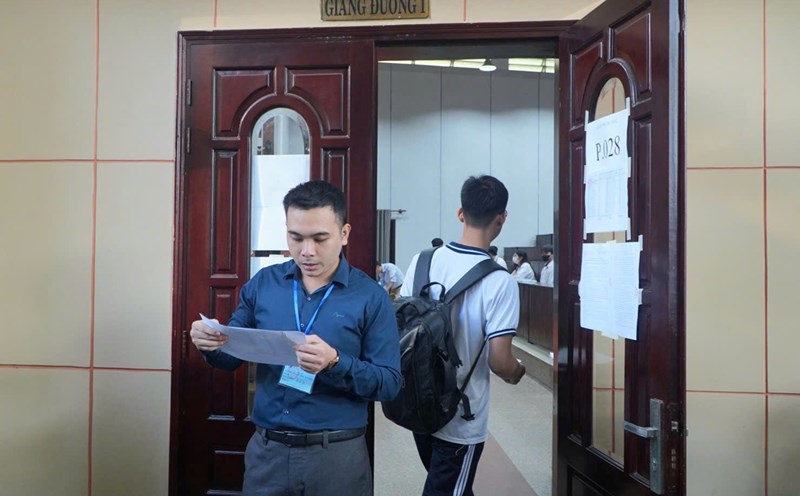Transferring money is refused, customers are surprised
Visiting a clothing store on Binh Dong Street (District 8), Ms. Le My Phuong chose a satisfactory item with a bill of nearly 1.5 million VND. However, when paying, the staff informed the store that they would not accept transfers to invoices over 1 million VND and asked them not to record content such as "buy and sell", "pay", "buy goods" in the transaction.
"I was quite surprised because before, the store still accepted transfers normally. With this requirement, I had to leave an item because I did not have enough cash, Ms. Phuong shared.
A similar situation also occurred at a restaurant in District 10, where a sign was posted "Please pay in cash". Mr. Nguyen Quang (residing in District 10) said: "I planned to buy food but saw the notice so I stopped. When asked why, the restaurant just shook its head.
According to Lao Dong newspaper, the phenomenon of refusing to transfer money is not popular, but has begun to appear in some small stores and restaurants, especially those run by large traders. Some locations have suspended transfers without explaining a clear reason.

Mr. T.V.V, the owner of a restaurant in District 10, frankly said: "Before, I paid a few million in contract tax each month. Now that I have moved to a business or used an electronic invoice, I have to declare revenue, expenses, and hire someone to be an accountant. There was a lot of trouble, so I limited receiving transfers.
Can't "escape" taxes with cash
In an interview with Lao Dong, Associate Professor, Dr.LS. Bui Kim Hieu - Head of the Faculty, Faculty of Social Sciences - International Languages, Gia Dinh University said that according to Decree 70, from June 1, individuals and business households that are paying contract tax and have a revenue of VND1 billion/year or more must apply electronic invoices generated from cash registers connected to tax authorities. Revenue will be calculated correctly, fully, and closer to reality, accordingly, the contract tax rate may be adjusted.
Applying the provisions of Circular 40/2021, individuals and business households with a revenue of VND 100 million or more per year are required to pay 3 types of taxes and fees including: Card fee, value added tax (VAT) and personal income tax.
With the application of invoice and electronic document management, many businesses have begun to calculate VAT on customers' invoices. Accordingly, the price of goods reaching consumers is higher. "Making" transfers and receiving cash from business households is a misunderstanding about tax obligations.
"Whether receiving cash or transferring money, dividing money into different receiving accounts, changing the content of receiving money, or whatever way, the tax obligations of business individuals still occur. Tax obligations are based on the nature of business activities, only when the revenue is below VND 100 million/year (the following year is below VND 200 million/year) is not required to pay tax - Associate Professor, Dr.LS. Bui Kim Hieu said.
According to Associate Professor, Dr.LS. Bui Kim Hieu, currently, there is no regulation prohibiting consumers from using cash to pay for goods and services; at the same time, there is no regulation prohibiting individuals or businesses from receiving cash payments. Therefore, in principle, consumers and business individuals have the right to use cash to pay for goods and services to each other. Therefore, it is impossible to limit all acts of receiving cash payments by business individuals or enterprises to the purpose of "taking advantage of taxes", especially in a society with a very popular practice of using cash as in Vietnam today.
Therefore, whether individuals and businesses refuse to let customers pay by bank transfer for the purpose of "taking in taxes" or not needs to be determined by competent authorities through professional measures.
In case there is sufficient basis to prove that a business individual or enterprise is tax evasion, depending on the nature and severity of the violation, the business individual or enterprise may be subject to administrative sanctions according to Decree 125/2020/ND-CP or may be prosecuted for criminal liability according to the provisions of Article 200 of the 2015 Penal Code (amended and supplemented in 2017).











